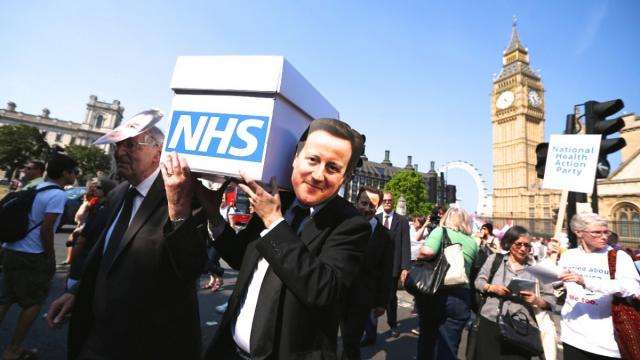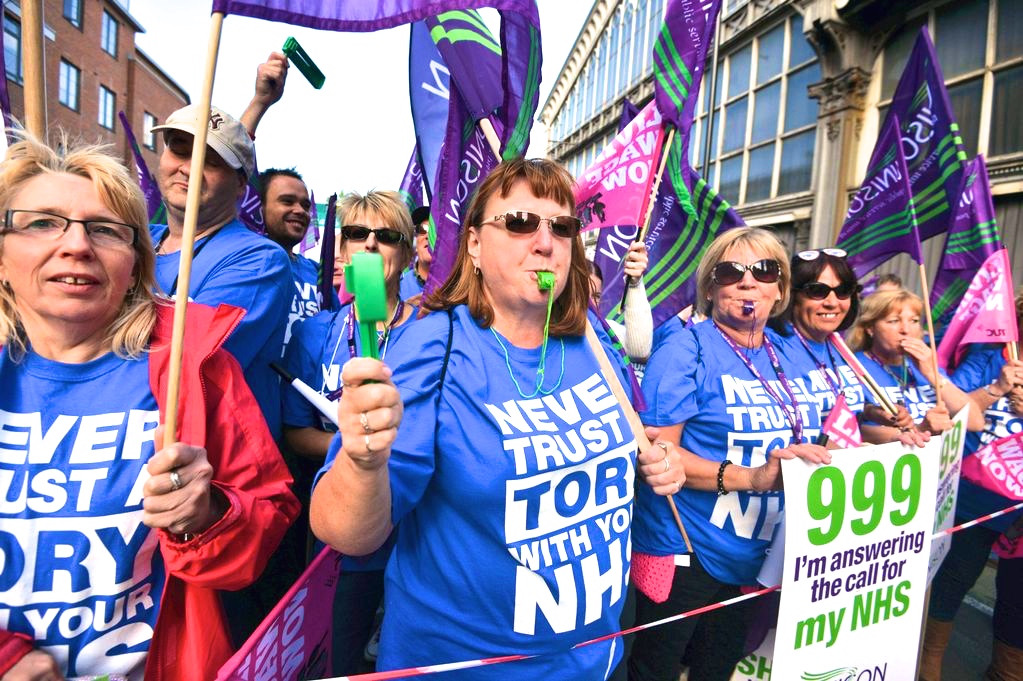
As the Conservatives settled into their seats at the Manchester Central Convention Centre for the annual Conservative Party Conference earlier this month, up to 60,000 protesters gathered outside, collectively voicing outrage about government policies that include National Health Service reforms, spending and benefit cuts, and restrictions on trade unions.
The People’s Assembly Against Austerity demonstration united opposition forces ranging from trade union groups to Jews for Palestine to disabled people operating wheelchairs and buggies. The tens of thousands of protesters at the Manchester march did, after all, share one thing in common: they represent a joint challenge to the Conservative government, whose harsh austerity policies they say target society's most vulnerable while lining the pockets of the wealthiest.
NHS Reforms
On the day the U.K. Health Secretary Jeremy Hunt was due to address the Conservative conference, pro-NHS campaigners gathered outside to welcome his speech. The protest was called "Hands Off Our NHS" and saw various campaign groups unite to oppose the privatization of the NHS.
Prime Minister David Cameron’s famous promise to "cut the deficit, not the NHS" seems preposterous now to many – given the fact that government has reduced the cash it pays to hospitals throughout Britain by more than 40 percent for a quarter of treatments.
The NHS Support Federation found that 70 percent of NHS contracts awarded between April 2013 and April 2014 went to the private sector. These private contracts cover every element of patient and healthcare support including diagnosis, treatment and ongoing healthcare.
Despite denials of NHS privatization by the Tory government, the figures speak for themselves. The NHS Support Federation analysis further revealed that NHS privatization has soared by 500 percent during the last year, as private companies won £3.5 billion ($5.4 billion) in health contracts.
In March of this year, The Guardian published what it referred to as the “biggest privatization in NHS history,” citing leaked documents that describe how the county of Staffordshire was planning a £1.2 billion sell-off of cancer and end-of-life care without adequate patient consultation.
Union Restrictions
Another common theme at the anti-austerity rally earlier this month was the campaign against trade union restrictions.
Protesting against the government’s recent trade union bill – unveiled by the government in July, it represents the biggest crackdown on trade union rights in 30 years – thousands of union campaigners joined the protest, armed with the slogan “No to austerity, yes to workers’ rights."
Included in the government's proposed crackdown are the criminalization of picketing, the thwarting the flow of union funds to the Labour Party, and a requirement that at least 40 percent of voting people support a strike when it's called for most public services. The scale of the proposals have been likened to the harsh crackdown of trade union rights introduced in 1985 by Norman Tebbit, Margaret Thatcher’s Secretary of State for Trade and Industry.
At the demo, members of the Trade Union Congress said that in response to the Tories’ effort to make it harder for unions to take strike action, workers and unions need to speak out and reject austerity measures.
Welfare Cuts
A sea of "anti-welfare cuts" placards was another dominant feature at the People’s Assembly Against Austerity protest, reflecting one of the biggest attacks against the Tory regime, which has cut into the welfare state.
In the 2015 Budget, Chancellor George Osborne announced Britain would proceed with £12 billion in welfare cuts despite the wave of protests staged in opposition to the austerity program, and the scale of the proposed reductions. Cuts made to tax credits awarded to people on low pay, housing benefit, and disability and incapacity benefits have been particularly painful across Britain and the subject of widespread controversy and unrest.
The Welfare of Refugees
Another large and compelling opposition group at the march were those rejecting the government’s response to the refugee crisis. PM David Cameron’s pledge to take 20,000 Syrian refugees into the U.K. over the next five years has been criticized by many for being “too low, too slow and too narrow.” According to a statement recently published by 300 senior lawyers, retired judges and former law lords, the U.K.’s asylum policy is “deeply inadequate.”
The criticism coming from "prominent" figures followed continuous disparagement by many in Britain who were shocked at the government’s inadequate treatment of migrants. Last month, thousands gathered to hear the newly elected Labour leader Jeremy Corbyn in a rally in London call upon government to recognize the UK’s “obligations” to help refugees.
The scale of the recent Manchester protest is but one sign that the Conservatives' economic agenda and austerity regime aren't going over well with U.K. citizens – and that unless the people's call is heard, more regular disruption can be expected not only here but across Britain in the months ahead.
3 WAYS TO SHOW YOUR SUPPORT
- Log in to post comments
















